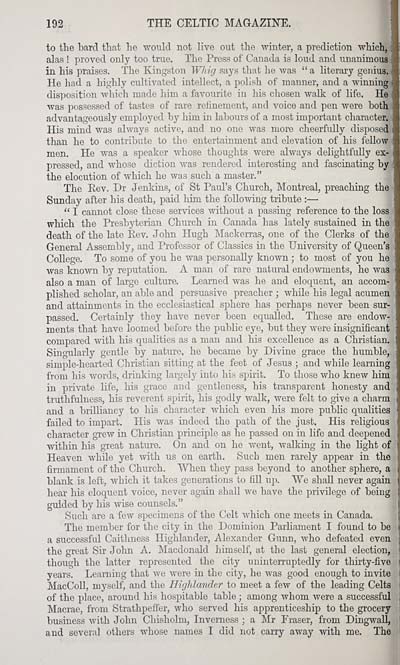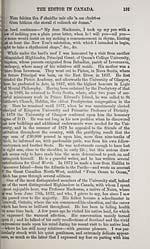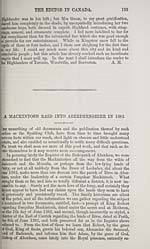Blair Collection > Celtic magazine > Volume 5
(202)
Download files
Complete book:
Individual page:
Thumbnail gallery: Grid view | List view

192 THE CELTIC MAGAZINE. T
to the bard that he would not live out the winter, a prediction which,
alas ! proved only too true. The Press of Canada is loud and unanimous
in his praises. The Kingston WJrig says that he was "a literary genius.
He had a highly cultivated intellect, a polish of manner, and a winning i
disposition which made him a favourite in his chosen walk of life. He
was possessed of tastes of rare refinement, and voice and pen were both
advantageously employed by him in labours of a most important character.
His mind was always active, and no one was more cheerfully disposed
than he to contribute to the entertainment and elevation of his feUow
men. He was a speaker whose thoughts were always delightfully ex-
pressed, and whose diction was rendered interesting and fascinating by
the elocution of which he was such a master."
The Eev. Dr Jenkins, of St Paul's Church, Montreal, preaching the
Sunday after his death, paid him the following tribute : —
" I cannot close those services without a passing reference to the loss
which the Presbyterian Church in Canada has lately sustained in the ''
death of the late Eev. John Hugh Mackerras, one of the Clerks of the
General Assembly^ and Professor of Classics in the University of Queen's
College. To some of you he was personally known ; to most of you he :.ji
was known by reputation. A man of rare natural endowments, he was
also a man of large culture. Learned was he and eloquent, an accom-
plished scholar, an able and persuasive preacher ; while his legal acumen
and attainments in the ecclesiastical sphere has perhaps never been sur-
passed. Certainly they have never been equalled. These are endow-
ments that have loomed before the public eye, but they were insignificant
compared with his qualities as a man and his excellence as a Christian.
Singularly gentle hy nature, he became by Divine grace the humble,
simple-hearted Christian sitting at the feet of Jesus ; and while learning
from his words, drinking largely into his spirit. To those who knew him
in private life, his grace and gentleness, his transparent honesty and ij
truthfulness, his reverent spirit, his godly walk, were felt to give a charm '
and a brilliancy to his character which even his more public qualities
failed to impart. His was indeed the path of the just, His religious
character grew in Christian principle as he passed on in life and deepened
within his great nature. On and on he went, walking in the light of
Heaven while yet with us on earth. Such men rarely appear in the
firmament of the Church. When they pass beyond to another sphere, a
blank is left, which it takes generations to fill up. We shall never again
hear his eloquent voice, never again shall we have the privilege of being
guided by his wise counsels."
Such are a few specimens of the Celt which one meets in. Canada.
The member for the city in. the Dominion Parliament I found to be
a successful Caitliness Highlander, Alexander Gunn, who defeated even
the great Sir John A. Macdonald himself, at the last general election,
though the latter represented the city uninterruptedly for thirty-five
years. Learning that we were in the city, he was good enough to invite
MacCoU, myself, and the Higlilander to meet a few of the leading Celts j
of the place, around his hospitable table ; among whom were a successful \
Macrae, from Strathpefler, who served his apprenticeship to the grocery ;
business with John Chisholm, Inverness ; a Mr Eraser, from Dingwall, '
and several others whose names I did not carry away with me. The
i
to the bard that he would not live out the winter, a prediction which,
alas ! proved only too true. The Press of Canada is loud and unanimous
in his praises. The Kingston WJrig says that he was "a literary genius.
He had a highly cultivated intellect, a polish of manner, and a winning i
disposition which made him a favourite in his chosen walk of life. He
was possessed of tastes of rare refinement, and voice and pen were both
advantageously employed by him in labours of a most important character.
His mind was always active, and no one was more cheerfully disposed
than he to contribute to the entertainment and elevation of his feUow
men. He was a speaker whose thoughts were always delightfully ex-
pressed, and whose diction was rendered interesting and fascinating by
the elocution of which he was such a master."
The Eev. Dr Jenkins, of St Paul's Church, Montreal, preaching the
Sunday after his death, paid him the following tribute : —
" I cannot close those services without a passing reference to the loss
which the Presbyterian Church in Canada has lately sustained in the ''
death of the late Eev. John Hugh Mackerras, one of the Clerks of the
General Assembly^ and Professor of Classics in the University of Queen's
College. To some of you he was personally known ; to most of you he :.ji
was known by reputation. A man of rare natural endowments, he was
also a man of large culture. Learned was he and eloquent, an accom-
plished scholar, an able and persuasive preacher ; while his legal acumen
and attainments in the ecclesiastical sphere has perhaps never been sur-
passed. Certainly they have never been equalled. These are endow-
ments that have loomed before the public eye, but they were insignificant
compared with his qualities as a man and his excellence as a Christian.
Singularly gentle hy nature, he became by Divine grace the humble,
simple-hearted Christian sitting at the feet of Jesus ; and while learning
from his words, drinking largely into his spirit. To those who knew him
in private life, his grace and gentleness, his transparent honesty and ij
truthfulness, his reverent spirit, his godly walk, were felt to give a charm '
and a brilliancy to his character which even his more public qualities
failed to impart. His was indeed the path of the just, His religious
character grew in Christian principle as he passed on in life and deepened
within his great nature. On and on he went, walking in the light of
Heaven while yet with us on earth. Such men rarely appear in the
firmament of the Church. When they pass beyond to another sphere, a
blank is left, which it takes generations to fill up. We shall never again
hear his eloquent voice, never again shall we have the privilege of being
guided by his wise counsels."
Such are a few specimens of the Celt which one meets in. Canada.
The member for the city in. the Dominion Parliament I found to be
a successful Caitliness Highlander, Alexander Gunn, who defeated even
the great Sir John A. Macdonald himself, at the last general election,
though the latter represented the city uninterruptedly for thirty-five
years. Learning that we were in the city, he was good enough to invite
MacCoU, myself, and the Higlilander to meet a few of the leading Celts j
of the place, around his hospitable table ; among whom were a successful \
Macrae, from Strathpefler, who served his apprenticeship to the grocery ;
business with John Chisholm, Inverness ; a Mr Eraser, from Dingwall, '
and several others whose names I did not carry away with me. The
i
Set display mode to: Large image | Transcription
Images and transcriptions on this page, including medium image downloads, may be used under the Creative Commons Attribution 4.0 International Licence unless otherwise stated. ![]()
| Early Gaelic Book Collections > Blair Collection > Celtic magazine > Volume 5 > (202) |
|---|
| Permanent URL | https://digital.nls.uk/76451274 |
|---|
| Description | Volume V, 1880. |
|---|---|
| Shelfmark | Blair.6 |
| Attribution and copyright: |
|
| Description | A selection of books from a collection of more than 500 titles, mostly on religious and literary topics. Also includes some material dealing with other Celtic languages and societies. Collection created towards the end of the 19th century by Lady Evelyn Stewart Murray. |
|---|
| Description | Selected items from five 'Special and Named Printed Collections'. Includes books in Gaelic and other Celtic languages, works about the Gaels, their languages, literature, culture and history. |
|---|

